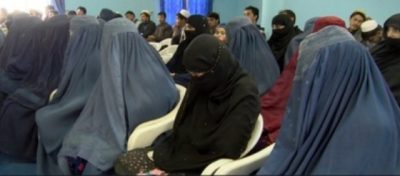Protecting Afghan Women Is A National Security Issue
by Abigail R. Esman
Special to IPT News
Investigative Project on Terrorism

There was the woman whose husband sliced off her genitalia, and then reached inside her with his hand, damaging her inner organs.
There was the woman whose husband cut off her ear.
More commonly, there are the rapes, the forced marriages, and the mob beatings, such as the one last December: video shows a woman dressed in a blue burqa, being beaten by crowds of men – including family members – as onlookers call out “Allahu Akbar!”
Such is life for women in Afghanistan, where an estimated 87 percent of them have experienced physical or sexual abuse, or both. Their stories are part of what has made Afghanistan the worst country in the world for women.
In the weeks following America’s first attacks in Afghanistan during the fall of 2001, images of burqa-clad women tearing off the imprisoning garments filled TV news reports. With tremendous satisfaction, Americans praised themselves for beating back the Taliban – the terror-supporting militia that not only ruled much of the country, but had harbored Osama bin Laden – and for liberating Afghan women. The images of them without their burqas were our proof: America had once more helped forge a victory for the oppressed.
Except, as it turned out, we hadn’t.
While the Taliban no longer hold power over many of the regions it ruled before the American invasion, the group still maintains control over several rural areas of the country, as do other militia groups which impose similar constraints on women. Moreover, low female literacy rates have ranked Afghan fourth on the list of 10 worst places for girls’ education, according to a report from global anti-poverty group ONE. The other nine countries are all in Africa.
In rural regions, 90 percent of women are illiterate, versus 63 percent of men – numbers that are deeply disturbing for both genders, since, as UNESCO and others have observed, literacy is directly related to political empowerment. But the problem particularly affects women, and is arguably a strategic measure: in the words of former UN Secretary General Ban Ki-Moon, “by acquiring literacy, women become more economically self-reliant and more actively engaged in their country’s social, political and cultural life.”
The refusal to educate women represents, in other words, not just a systemic oppression, but enslavement.
Which is why the abuse of women includes depriving them of schooling – and why such abuse in Afghanistan and other war- torn countries like Iraq, the Congo, Somalia and Sudan, should be of profound concern to Americans and the West.
Researchers, particularly Valerie M. Hudson, director of the Womanstats project and George W. Bush Chair of the Bush School of Government at Texas A&M University, have shown definitive links between the societies that produce terrorists and the rate of domestic abuse and the oppression of women. As Hudson puts it in her book Sex And World Peace, “states characterized by norms of gender and ethnic inequality as well as human rights abuses are more likely to become involved in militarized interstate disputes, to be the aggressors in international disputes, and to rely on force when involved in an international dispute…. International security cannot be attained without gender equality.”
It is likely no coincidence then that the Afghan man who cut off his wife’s labia was a member of a powerful militia; or that ISIS fighters kidnapped and enslaved Yazidi women; or – closer to home – that Pulse nightclub shooter Omar Mateen allegedly abused, even tortured, his ex-wife; that Boston Marathon bomber Tamerlan Tsarnaev was arrested for beating an ex-girlfriend; that Syed Farook, the San Bernardino shooter, grew up in an abusive home; and so on. Such examples demonstrate with utter clarity that, as Hudson notes in a quote from former Secretary of State Hillary Rodham Clinton, “the subjugation of women is a direct threat to the security of the United States.”
But nearly 17 years after 9/11 and the American invasion, with a cost of more than $1 trillion and the loss of nearly 2,500 troops, Americans’ support for the Afghan war is dwindling. What’s more, terrorist attacks on aid organizations, coupled with declines in funding, are causing many to rethink their presence there. A number of aid groups have already cut back significantly on staff and reduced their outreach.
Yet on the home front, Americans are now focusing with new intensity on the issue of domestic violence in their own country, particularly in the wake of allegations that former Trump White House Staff Secretary Rob Porter abused his two ex-wives, and the ongoing #metoo movement. But if we are truly concerned about such abuse, how can Americans then turn their backs on these women and the intensity of their suffering? Or are the rights of Afghan women an Afghan, not an American problem?
In 2010, I penned an article condemning Dutch leaders for withdrawing troops from the Afghan conflict. “If we are fighting a war on terror,” I wrote, “are we not also fighting against the terror that rules these women’s lives?
The responses were swift and vicious, and while they are no longer visible online, I remember them well. No, the all-male readership responded. Our soldiers do not need to risk their lives for another country’s women.
Eight years later, I am more convinced than ever they were wrong – the more so in the face of Hudson’s research. That doesn’t necessarily mean that America needs to keep large numbers of boots on the ground in Afghanistan. But as Leah Greenslade, Vice Chair of the MDG Health Alliance, a UN affiliate, has noted, programs are desperately needed that will engage young men in these regions to reduce violence against women “as a strategy for peace, security, and economic social development.” And those programs – and their workers — need to be kept safe.
Yet Afghan organizations and politicians are doing little to help in this regard. In their place, if not for Afghan women’s safety, then for the sake of our own, America must.
Abigail R. Esman, the author, most recently, of Radical State: How Jihad Is Winning Over Democracy in the West (Praeger, 2010), is a freelance writer based in New York and the Netherlands. Follow her at @radicalstates.

The Investigative Project on Terrorism kindly allows Modern Tokyo Times to publish their articles. This important think tank provides essential information in the area of terrorism.
https://twitter.com/TheIPT Investigative Project on Terrorism twitter account
http://www.investigativeproject.org/ – Investigative Project on Terrorism
https://www.investigativeproject.org/7351/protecting-afghan-women-is-a-national-security